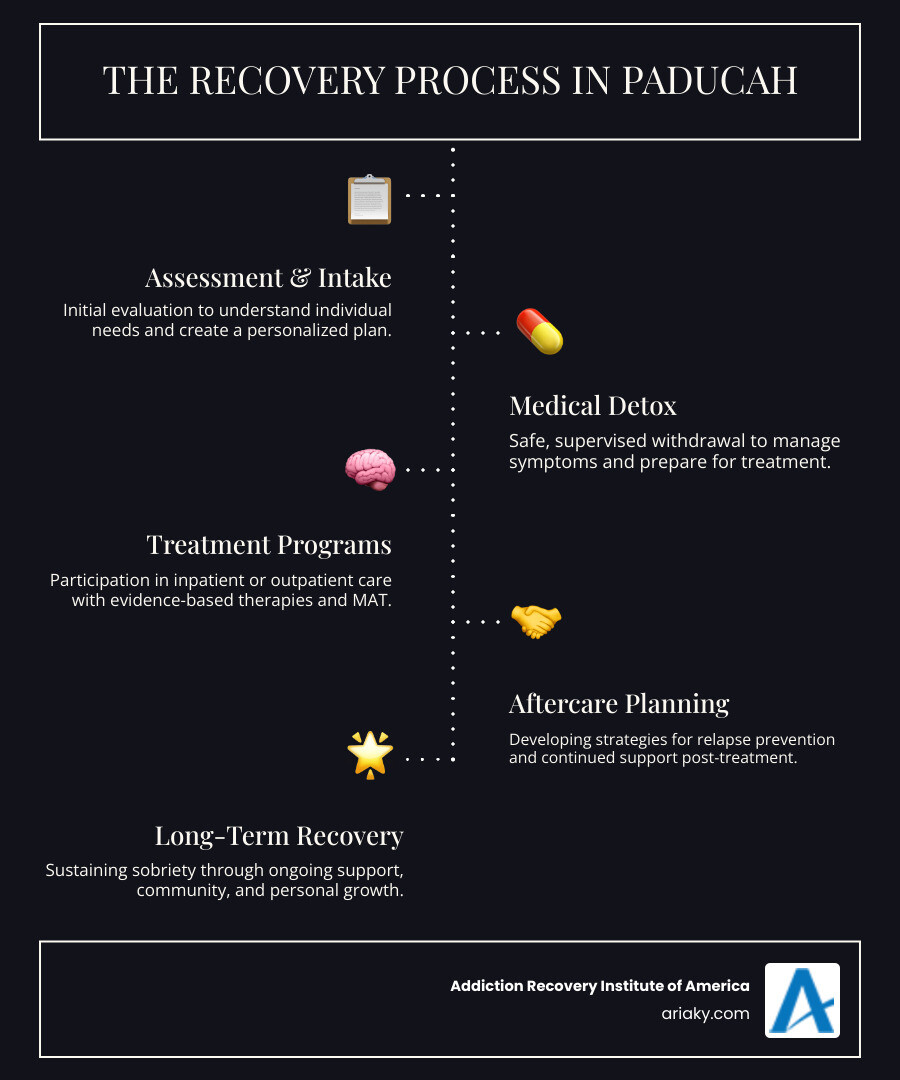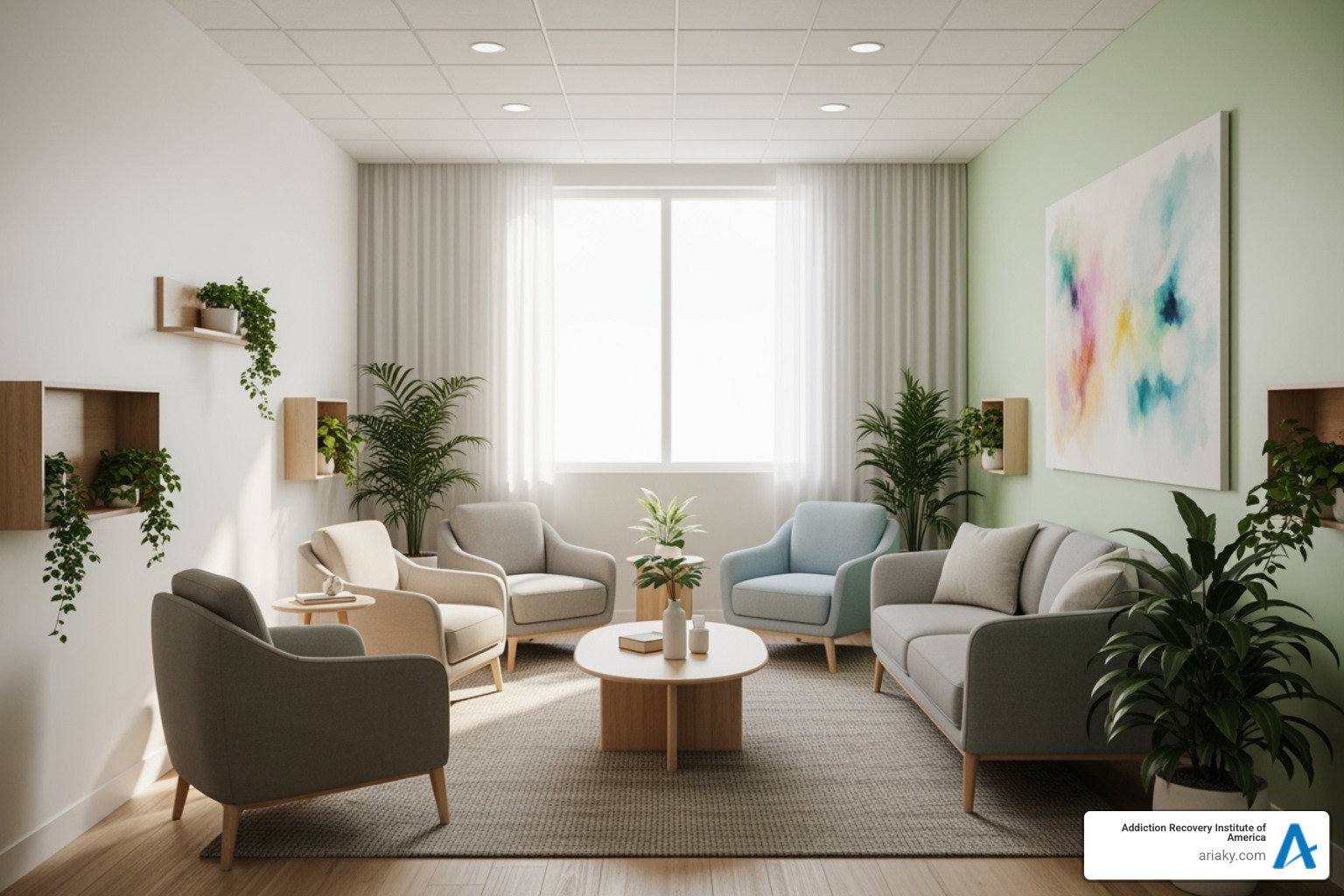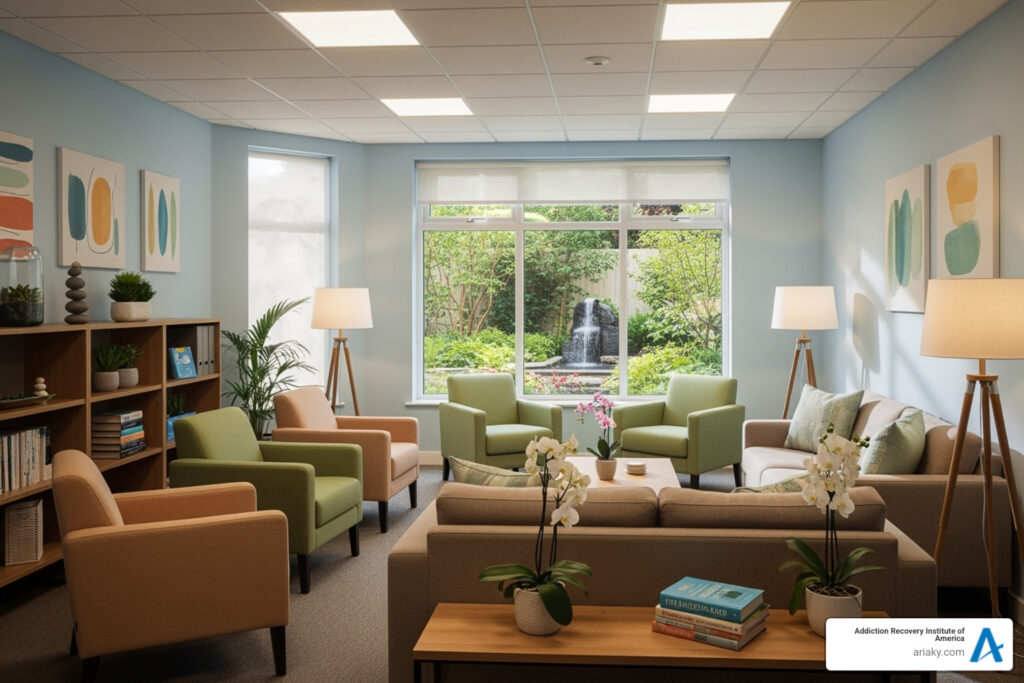Finding the Right Addiction Treatment in Paducah, Kentucky
If you’re searching for drug rehab paducah options, you’re taking a crucial first step toward recovery. Paducah offers several quality addiction treatment centers that provide comprehensive care for substance use disorders, including our own AODE-certified facility, the Addiction Recovery Institute of America (ARIA).
The journey from addiction to recovery isn’t easy, but it’s absolutely possible. Research shows that high-quality treatment centers can achieve success rates for sobriety that are more than double the national average of 40%. This demonstrates that choosing the right treatment center makes a real difference.
Whether you need medical detox, intensive inpatient care, or flexible outpatient treatment, Paducah’s addiction treatment centers offer evidence-based therapies, medication-assisted treatment, and individualized care plans. Most facilities, including ARIA, accept major insurance plans including Medicaid, Medicare, and commercial insurance, making treatment accessible.
This comprehensive guide will help you understand your options, steer insurance coverage, and find the treatment approach that best fits your needs and circumstances.

Understanding the Types of Rehab Programs in Paducah
When you’re looking for drug rehab Paducah options, understanding the different types of programs available can feel overwhelming. But here’s the thing – each program is designed with a specific purpose in mind, and finding the right match for your situation is one of the most important decisions you’ll make on your recovery journey.
Think of it like choosing the right tool for a job. You wouldn’t use a hammer when you need a screwdriver, right? The same principle applies to addiction treatment. Let’s walk through your options together.
Inpatient and Residential Treatment
Picture this: a place where your only job is to focus on getting better. No work stress, no household chores, no familiar triggers calling your name from the next room. That’s what residential treatment offers – complete immersion in your recovery.
These programs provide 24/7 care in a structured environment where every day is planned with your healing in mind. You’ll participate in intensive therapy sessions, both one-on-one and in groups. You’ll eat meals with others who understand your struggle, creating natural peer support that often becomes lifelong friendship.
Residential treatment is typically ideal for severe addiction cases, especially when you need to step away from an environment that’s been feeding your addiction. It’s also perfect if you’ve tried outpatient treatment before but found yourself struggling without that extra layer of support.
At Addiction Recovery Institute of America, our residential programs create that safe haven where you can rebuild your foundation for sobriety without the distractions and pressures of everyday life.
More info about Residential Treatment Program KY
Outpatient Programs (PHP, IOP, and Standard)
Maybe you’re thinking, “I need help, but I can’t just disappear from my life for weeks or months.” That’s where outpatient programs shine – they offer the flexibility to get treatment while you live at home and maintain your responsibilities.
The Partial Hospitalization Program (PHP) is like having your cake and eating it too. You get intensive treatment during the day – we’re talking several hours, multiple days a week – but you sleep in your own bed at night. It’s perfect if you’re stepping down from residential care or need something more intensive than traditional outpatient but less than full residential.
Then there’s the Intensive Outpatient Program (IOP), which gives you substantial support while allowing more flexibility for work or family commitments. You might attend sessions three to four times a week for a few hours each time. It’s designed to help you practice your recovery skills in real-world situations while still having that safety net of regular professional support.
Standard outpatient treatment is the most flexible option, typically involving weekly or bi-weekly sessions. It works well for people with less severe addictions or those who are maintaining their sobriety after completing a more intensive program.
Our IOP at Addiction Recovery Institute of America understands that recovery doesn’t happen in a vacuum – it happens in your real life, with real challenges and real victories.
More info about Intensive Outpatient Program (IOP) Kentucky
More info about Outpatient Treatment Program KY
Medical Detox: The First Step to Recovery

Let’s be honest about something that scares a lot of people: withdrawal. The thought of going through detox can be terrifying, but here’s what you need to know – medically supervised withdrawal doesn’t have to be the nightmare you’re imagining.
Medical detox is about managing symptoms safely while your body adjusts to functioning without substances. Think of it as having a skilled medical team in your corner, monitoring your progress and making sure you’re as comfortable as possible during this crucial first step.
Detox is essential for certain substances, particularly opiates, alcohol, and benzodiazepines. With these substances, withdrawal isn’t just uncomfortable – it can actually be dangerous without proper medical supervision.
During our comfort detox at Addiction Recovery Institute of America, we understand that every person and every substance is different. That’s why we provide individualized, medically supervised care to make this process as safe and manageable as possible. You’re not going through this alone.
More info about Kentucky Detox Programs
Inpatient vs. Outpatient Care
Choosing between inpatient and outpatient care is one of those decisions that keeps people up at night. Here’s a straightforward comparison to help you think through what might work best for your situation:
| Criteria | Inpatient Care | Outpatient Care |
|---|---|---|
| Intensity of Care | Highest level with 24/7 supervision and support | Varies from intensive daily sessions to weekly appointments |
| Living Situation | You live at the treatment facility | You live at home or in sober living |
| Ideal Candidate | Severe addiction, unstable home environment, history of relapse, need for detox | Stable support system, work/family commitments, milder addiction, stepping down from higher care |
| Cost | Higher due to housing and round-the-clock care | Lower without accommodation expenses |
| Flexibility | Highly structured daily schedule | High flexibility to maintain daily responsibilities |
The truth is, there’s no “wrong” choice here – only what’s right for you at this moment in your recovery journey. Sometimes you might start with one level of care and move to another as your needs change.
More info about Inpatient vs Outpatient
Key Services and Therapies at Paducah Addiction Treatment Centers
The heart of successful drug rehab paducah treatment lies in the specialized services and therapies that help people understand their addiction, develop healthy coping skills, and rebuild their lives. These aren’t just feel-good activities – they’re scientifically proven methods that form the foundation of lasting recovery.
Evidence-Based Behavioral Therapies
Think of behavioral therapies as your personal toolkit for recovery. These proven approaches help you understand the “why” behind your substance use and teach you practical skills to handle life’s challenges without turning to drugs or alcohol.
Cognitive Behavioral Therapy (CBT) is like becoming a detective of your own thoughts. You’ll learn to spot the thinking patterns that lead to substance use and develop healthier ways to respond. It’s incredibly empowering when you realize you can change how you react to stress, cravings, or difficult emotions.
Dialectical Behavior Therapy (DBT) takes things a step further, especially if you’re dealing with intense emotions or relationship struggles. This approach teaches you how to ride out emotional storms without making things worse, and how to communicate your needs more effectively.
Individual counseling gives you a safe, private space to dig deeper into personal issues. Whether you’re working through trauma, family problems, or just figuring out who you are without substances, these one-on-one sessions are where real breakthroughs happen.
Group therapy might feel intimidating at first, but many people find it becomes their favorite part of treatment. There’s something powerful about sitting with others who truly understand your struggles. You’ll share experiences, learn from each other’s successes and setbacks, and build friendships that can last long after treatment ends.
Family therapy recognizes that addiction affects everyone who loves you. These sessions help repair damaged relationships, improve communication, and teach your family how to support your recovery without enabling unhealthy behaviors.
More info about Cognitive Behavioral Therapy Program
More info about Family Therapy Program KY
Medication-Assisted Treatment (MAT) for drug rehab in Paducah

Let’s clear up a common misconception: Medication-Assisted Treatment (MAT) isn’t replacing one addiction with another. It’s a scientifically-backed approach that combines FDA-approved medications with counseling to give you the best chance at recovery.
For opioid addiction, medications like Suboxone can be life-changing. They help manage withdrawal symptoms and reduce cravings without causing the dangerous highs associated with street opioids. This gives you the mental clarity and stability needed to focus on therapy and rebuilding your life.
For alcohol addiction, medications like Naltrexone can significantly reduce cravings and help prevent relapse. These medications work by blocking the pleasurable effects of alcohol or reducing the desire to drink in the first place.
The beauty of MAT is that it allows you to function normally while your brain heals from addiction. Instead of spending all your energy fighting intense cravings, you can focus on learning new coping skills, repairing relationships, and planning for your future.
More info about Medication Assisted Treatment
Dual Diagnosis for Co-Occurring Disorders
Here’s something many people don’t realize: addiction rarely travels alone. If you’re struggling with substance use, there’s a good chance you’re also dealing with depression, anxiety, trauma, or another mental health condition. This is called a dual diagnosis, and it’s more common than you might think.
The challenge is that these conditions feed off each other. You might drink to numb anxiety, but alcohol actually makes anxiety worse over time. Or you might use drugs to escape depression, only to find that coming down makes you feel even more hopeless.
That’s why integrated treatment is so important. Instead of treating your addiction and mental health separately, the best drug rehab paducah programs address both at the same time. Your therapist understands how depression might trigger your substance use, or how trauma from your past might be driving your need to escape through drugs or alcohol.
This comprehensive approach means you’re not just getting clean – you’re learning to manage all the underlying issues that contributed to your addiction in the first place. It’s the difference between putting a band-aid on a wound and actually healing it from the inside out.
More info about Trauma-Related Addiction Program KY
How to Choose the Right Drug Rehab Paducah for You
Finding the perfect drug rehab Paducah can feel like searching for a needle in a haystack, but we’re here to help you narrow down the options. Your specific needs, preferences, and circumstances will guide you to the best choice.
1. Verify Accreditation and Licensing
When you’re searching for the right drug rehab Paducah facility, think of accreditation as your safety net. It’s like having a trusted friend vouch for a restaurant before you try it – these credentials tell you that experts have thoroughly evaluated the facility and found it meets high standards for quality and safety.
You wouldn’t trust your car to an unlicensed mechanic, so why would you trust your recovery to an unaccredited treatment center? Proper accreditation means the facility follows evidence-based practices, employs qualified staff, and maintains ethical standards that put your wellbeing first.
AODE certification is particularly important in Kentucky. This credential from the Kentucky Cabinet for Health and Family Services shows that a facility meets state requirements for Alcohol and Other Drug Entities. At the Addiction Recovery Institute of America, we’re proud to hold this certification because it demonstrates our commitment to providing quality care that meets Kentucky’s rigorous standards.
CARF accreditation from the Commission on Accreditation of Rehabilitation Facilities is another gold standard. This international organization puts facilities through a comprehensive evaluation process, ensuring they deliver person-centered care and continuously improve their services. It’s like having a stamp of approval from the best in the business.
The Joint Commission is equally respected in healthcare accreditation. When you see this credential, you know the facility has undergone extensive review of their safety protocols, staff qualifications, and treatment approaches.
These accreditations aren’t just fancy certificates on the wall – they’re your assurance that you’ll receive ethical, evidence-based care from qualified professionals. Don’t hesitate to ask about a facility’s credentials when you call. Any reputable treatment center will be happy to share this information with you.
Find accredited facilities via SAMHSA
2. Look for Individualized Treatment Plans

Your addiction story is uniquely yours, and your recovery plan should reflect that. When searching for drug rehab Paducah options, one of the most important things to look for is a facility that creates individualized treatment plans rather than using a cookie-cutter approach.
Think about it – your relationship with substances, your triggers, your family dynamics, and your personal strengths are all different from the next person. A quality treatment center recognizes this and takes the time to understand your specific situation before crafting your recovery roadmap.
The best facilities will conduct thorough assessments that explore your substance use history in detail. They’ll want to know which substances you’ve used, for how long, and in what patterns. But they won’t stop there – they’ll also dig into your personal background, family relationships, work situation, and any previous treatment experiences.
Co-occurring disorders are another crucial piece of the puzzle. Many people struggling with addiction also deal with depression, anxiety, trauma, or other mental health challenges. A truly individualized plan addresses both your addiction and any underlying mental health concerns simultaneously.
At Addiction Recovery Institute of America, we believe that tailoring treatment programs to individual client needs is absolutely essential for lasting sobriety. Our team takes the time to understand your unique circumstances and creates a comprehensive plan that addresses every aspect of your well-being – not just your substance use.
Your treatment plan should feel like it was designed specifically for you, because it was. This personalized approach gives you the best chance at building a recovery that lasts.
More info about Individual Therapy Program
3. Inquire About Aftercare and Relapse Prevention
Think of recovery like learning to ride a bike – you don’t just hop on once and expect to never wobble again. Recovery is a lifelong journey, and the support you receive after completing your initial treatment can make all the difference between lasting sobriety and struggling alone.
The best drug rehab Paducah centers understand that your healing doesn’t stop when you walk out their doors. They’ll offer a comprehensive aftercare plan that acts like a safety net, catching you when life gets challenging and celebrating with you during the good times.
Sober living support provides a bridge between the structured environment of treatment and independent living. These safe, drug-free housing options give you time to practice your new coping skills while still having support nearby. It’s like having training wheels – you’re riding on your own, but with that extra stability when you need it.
Alumni programs connect you with others who’ve walked the same path. There’s something incredibly powerful about talking to someone who truly understands what you’ve been through. These programs often include regular meetups, social events, and mentorship opportunities that remind you you’re never alone in this journey.
Ongoing counseling keeps your mental health toolkit sharp and ready. Whether it’s individual sessions to work through new challenges or group therapy to maintain that sense of community, continued therapy helps you stay connected to your recovery goals.
The continuum of care is absolutely crucial because addiction is a chronic condition that requires ongoing management – just like diabetes or heart disease. When treatment centers prioritize aftercare, they’re showing they’re invested in your long-term success, not just getting you through their program.
More info about Addiction Recovery Challenges
4. Understand Success Rates
When you’re searching for drug rehab Paducah options, you’ll likely come across success rate statistics that can feel both encouraging and overwhelming. It’s completely natural to want to know your chances of achieving lasting recovery, and these numbers can provide valuable insight into a program’s effectiveness.
The truth is, success in recovery depends on several interconnected factors. Your personal commitment to the healing process plays the biggest role – recovery is something you actively participate in, not something that happens to you. The quality of the program you choose matters tremendously too. Programs that use evidence-based practices, offer individualized treatment plans, and provide comprehensive support tend to see better outcomes.
Perhaps most importantly, aftercare participation significantly impacts long-term success. The facilities that emphasize ongoing support, alumni programs, and relapse prevention strategies often see their clients maintain sobriety for years to come.
Success rates can vary between facilities, and it’s important to understand that each may define and measure “success” differently. While these numbers can be encouraging, they don’t tell the whole story.
Rather than getting caught up in comparing percentages, focus on finding a program that emphasizes evidence-based practices. Look for facilities that offer individualized care, strong therapeutic support, and robust aftercare planning. These elements are the real indicators of whether a program can help you build the foundation for lasting recovery.
You’re not just a statistic. Your journey is unique, and with the right support and commitment, recovery is absolutely possible regardless of what the numbers say.
Learn more from the National Institute on Drug Abuse
Navigating the Cost and Payment for Treatment
The financial aspect of seeking treatment can feel overwhelming, but here’s some encouraging news: quality drug rehab Paducah services are often more accessible than you might expect. Many people assume they can’t afford treatment, only to find that their insurance covers most of the costs, or that alternative payment options make recovery within reach.
Using Insurance for Rehab
Your health insurance likely covers more addiction treatment than you realize. Thanks to mental health parity laws, insurance companies must treat addiction and mental health coverage similarly to other medical conditions. This means your policy probably includes significant benefits for detox, residential treatment, and outpatient programs.
The key is verifying your coverage before you start treatment. At Addiction Recovery Institute of America, we offer free and confidential insurance verification to help you understand exactly what your plan covers. This process removes the guesswork and lets you focus on getting better instead of worrying about surprise bills.
Understanding the difference between in-network and out-of-network providers can save you money. In-network facilities have agreements with your insurance company, which typically means lower out-of-pocket costs for you. Out-of-network providers might still be covered, but usually at a different rate that could increase your expenses.
PPO plans generally give you more flexibility in choosing providers, while HMO plans typically require you to stay within a specific network of approved facilities. Either way, most comprehensive insurance plans cover essential addiction treatment services, including medical detox, therapy sessions, and medication-assisted treatment when needed.
More info about Aetna Insurance
More info about Blue Cross Blue Shield
Verify your insurance coverage
Other Payment Options for your drug rehab paducah
Even without private insurance, you still have pathways to quality treatment. Medicaid and Medicare provide healthcare coverage for eligible individuals, including comprehensive addiction treatment services. Many facilities throughout Kentucky accept these government programs, making treatment accessible regardless of your employment status or income level.
Private pay options offer flexibility for those who prefer to handle costs directly. Treatment centers often provide various payment plans that can make services more manageable for your budget. Some facilities offer sliding scale fees based on your income and ability to pay, ensuring that financial limitations don’t prevent you from getting help.
Kentucky offers several state-funded programs designed specifically to help residents access addiction treatment. These programs recognize that addiction affects people from all walks of life, regardless of their financial situation. Additionally, financial aid and grants from various organizations and treatment facilities can provide crucial support for covering treatment expenses.
The most important thing to remember is this: don’t let cost concerns prevent you from seeking help. Recovery is an investment in your future, your health, and your relationships. Our team at Addiction Recovery Institute of America works with you to explore every available option, ensuring that financial barriers don’t stand between you and the life-changing treatment you deserve.
More info about Paying for Treatment
Conclusion: Take the First Step Towards Recovery in Paducah
Your journey through this guide has shown you that drug rehab Paducah offers a rich landscape of healing opportunities. From the intensive, round-the-clock support of residential programs to the flexibility of outpatient care, from life-saving medical detox to evidence-based therapies that rewire thought patterns – every option we’ve explored represents real hope for lasting recovery.
The statistics speak volumes about what’s possible. With high-quality facilities reporting success rates far exceeding the national average, the right treatment program truly makes all the difference. But beyond numbers, what matters most is finding the path that resonates with your unique story and needs.
Remember the key elements that set quality treatment apart: accredited facilities with proper licensing, individualized treatment plans that honor your specific circumstances, and robust aftercare support that extends far beyond your initial program. These aren’t just checkboxes – they’re the foundation of programs that create lasting change.
Recovery is more than just stopping substance use. It’s about refinding who you are beneath the addiction, rebuilding relationships, and creating a life filled with purpose and joy. Every person who has walked this path before you started with that same first courageous step you’re considering right now.
At Addiction Recovery Institute of America, we understand that reaching out for help takes tremendous strength. We’ve designed our programs to meet you exactly where you are, whether you need medical detox, residential care, or outpatient support. Our AODE-certified team believes deeply in individualized care because we know that your recovery journey is uniquely yours.
The path forward isn’t always easy, but it’s absolutely worth it. Lasting sobriety is possible, and it starts with making that first phone call or walking through our doors.


